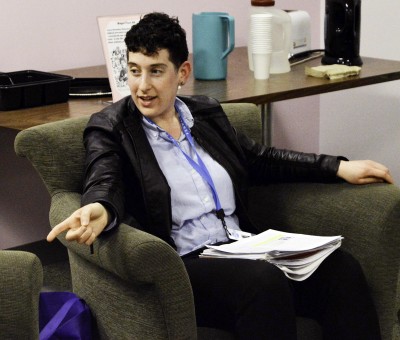
The Queer Activist Collective and Trans* Listening Circle at Boston University hosted a presentation Monday to raise awareness about sexual assault in the lesbian, gay, transgender and queer community.
Zohar Fuller, an outreach worker and advocate for the Violence Recovery Program branch of Fenway Health, spoke about resources and services available to those recovering from sexual assault at her talk in the Center for Gender, Sexuality and Activism at the George Sherman Union.
“We provide free counseling, advocacy and education for and about LGBTQ-identified survivors of partner abuse, police misconduct or hate crimes,” she said.
The presentation kicked off the CGSA and the Sexual Assault and Response Prevention Center’s Sexual Assault Awareness Week.
Fuller said survivors often experience difficulty in seeking services due to long waiting lists for shelters and the stigma that surrounds sexual assault.
“When we first started, it was quite a radical program, because no one was doing what the Violence Relief Program was doing,” she said. “We started in the Fenway area [and] started with a relationship with the police department and trying to navigate how folks could be treated better.”
Fenway Health partners with many other Boston area organizations to serve their clients, Fuller said. Sexual assault has been a prevalent issue among local college communities, and students should know what they could do independently to prevent instances of sexual assault, she said.
“I know that sexual assault has been an issue on Boston campuses recently, specifically the last two years,” she said after her presentation. “There has to be students acting out in response to when those events happen and not let it be shushed.”
Fuller said the LGTBQ sphere is especially in need of an understanding community to help because support for such survivors has not been prevalent in the past.
“The LGTBQ community is so small, at BU, in Boston, in the country, that the network is going to be so small that it makes it hard for some people to ask for help, because word travels,” she said after the talk. “If you can find people who can be supportive and remain confidential, reaching out to them as an ally could prevent their whole community from breaking.”
Boston is unique, Fuller said, because local resources and support have grown more prevalent, as reflected in the efforts by the CGSA to spread awareness about sexual assault.
Autumn McArthur, a sophomore in the College of Arts and Sciences and vice president of BU’s Queer Activist Collective, helped organized the event to include the LGBTQ community in SARP’s Sexual Assault Awareness Week.
“We just want people to know there are resources available for them because many times, queer people don’t often see health care institutions that deal with issues that are specific to us,” she said. “Knowing that there is a place to go for trauma and domestic violence is a good takeaway for anyone from today.”
McArthur said open dialogue about sexual assault is important on campus, regardless of the survivor’s identity.
“I don’t think people want to talk about it, but there is a rape culture on campus, and it’s important to bring to light that it is okay to talk about it, do some myth-busting and realize that this can be a campus that supports survivors,” she said. “There can be improvement, so BU can be a place that deals with domestic violence and sexual assault.”
Several students said they found the information from the presentation effective.
Olivia Lanman, a sophomore in CAS, said more open conversation about violence in the LGBTQ community can enable the larger discussion about sexual assault.
“Sexual assault is so prevalent in our community, but people aren’t aware of how prevalent it is within the LGTBQ community, so it’s nice to have an event centered around it that puts the focus directly on this because it’s sometimes something that gets looked over,” she said.
Vanessa Hayashi, a freshman in CAS, said increased awareness on campus is important so that students can help prevent potentially dangerous situations.
“I learned that there is so much domestic violence that people don’t see, and some can hide it very well,” she said. “People should be more conscious of bad situations and careful in dealing with people who might have experienced violence.”






















































































































